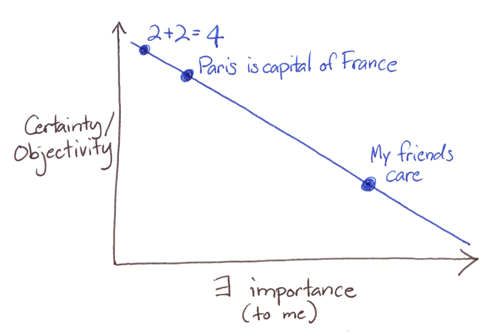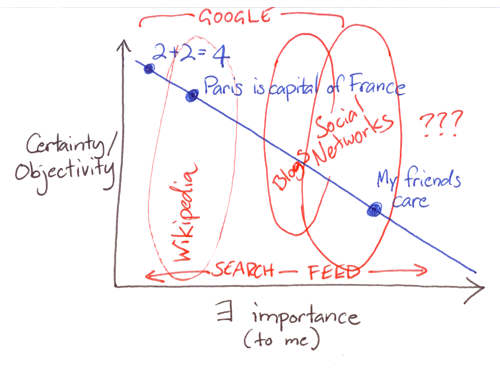Paris is the capital of France. Your friends care about you.
Both statements are probably true, right? But one statement is more objective, more verifiable. The other statement is more important to you, more meaningful to your life.
You can find evidence for one statement in Wikipedia. You can find evidence for the other in Facebook.

Many years ago in a college class about Soren Kiekegaard, the professor explained how Soren said there was an inverse relationship between certainty and existential importance. I drew a graph like the one above to help me remember.
On one extreme you have the facts of logic and mathematics; ultimately provable and objective, but not at all important to me as an individual existing human being. This is the realm of logic. On the other extreme is my eternal happiness; ultimately important to me, but not at all provable or objective. This is the realm of faith. (In the middle lie facts of science and history, childhood memories, and whether my wife loves me.) Soren was arguing against Christian apologetics, but I’ve found myself going back to this model lately when thinking about Wikipedia, Google, Facebook, and the evolution of the web.
The web began as the domain of objectivity, with scientific papers and news sites and other content modeled after the old publisher-consumer model. But the arrival of blogs and social networks began to give us more subjectively interesting information. The content of any given MySpace or Facebook page is meaningless dribble to 99.99% of the web populace. But if your married friend changes their relationship status to “It’s complicated”–as happened to me recently–that’s BIG news!
So what are the trends here?
- We are seeing more subjective information being published online, i.e. more info on the right side of the graph. How far will this go? What more personally interesting information is there? Biometrics? Morale?
- Wikipedia is cornering the market on objective information, i.e. covering the left side of the graph. This led some to speculate that Wikipedia will eat Google.
- Their is more objective information per person than subjective. This means you get objective information primarily via search. RSS readers and Facebook have shown that subjective information is best consumed as a feed. (Imagine the opposite! A Google interface for finding your friend’s favorite bands, or a feed of all new content on Wikipedia!)
Where do we go from here? 